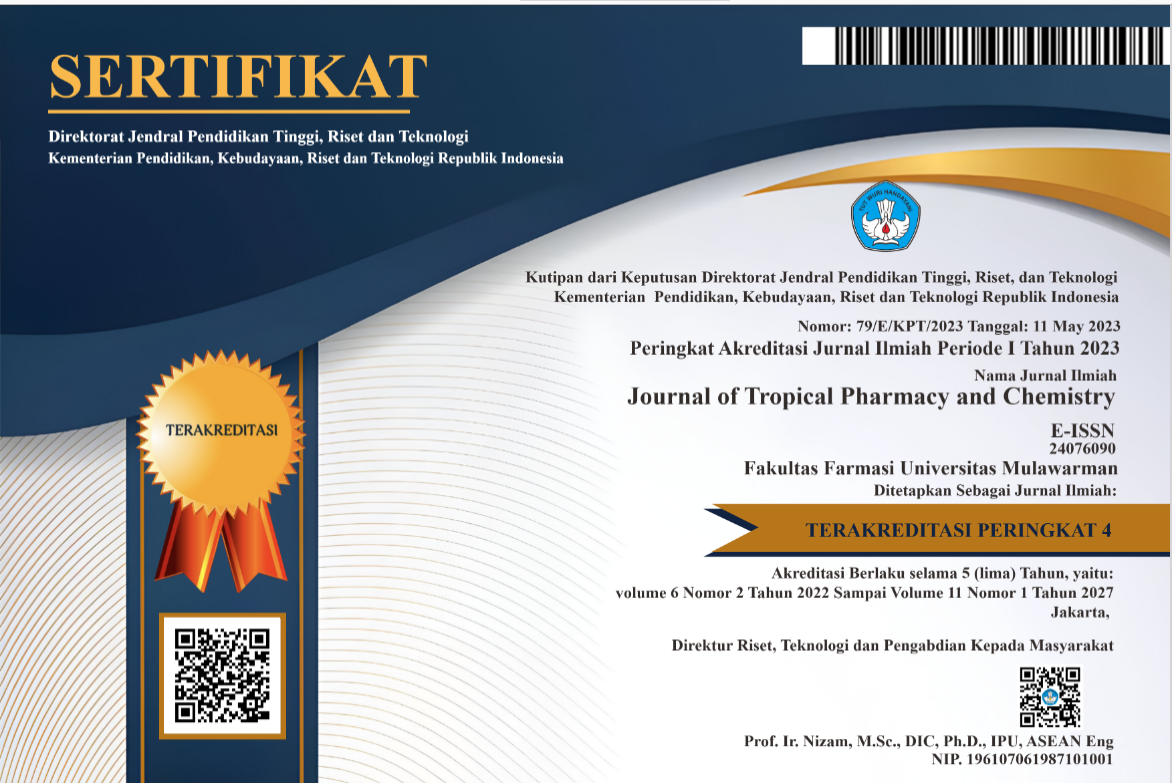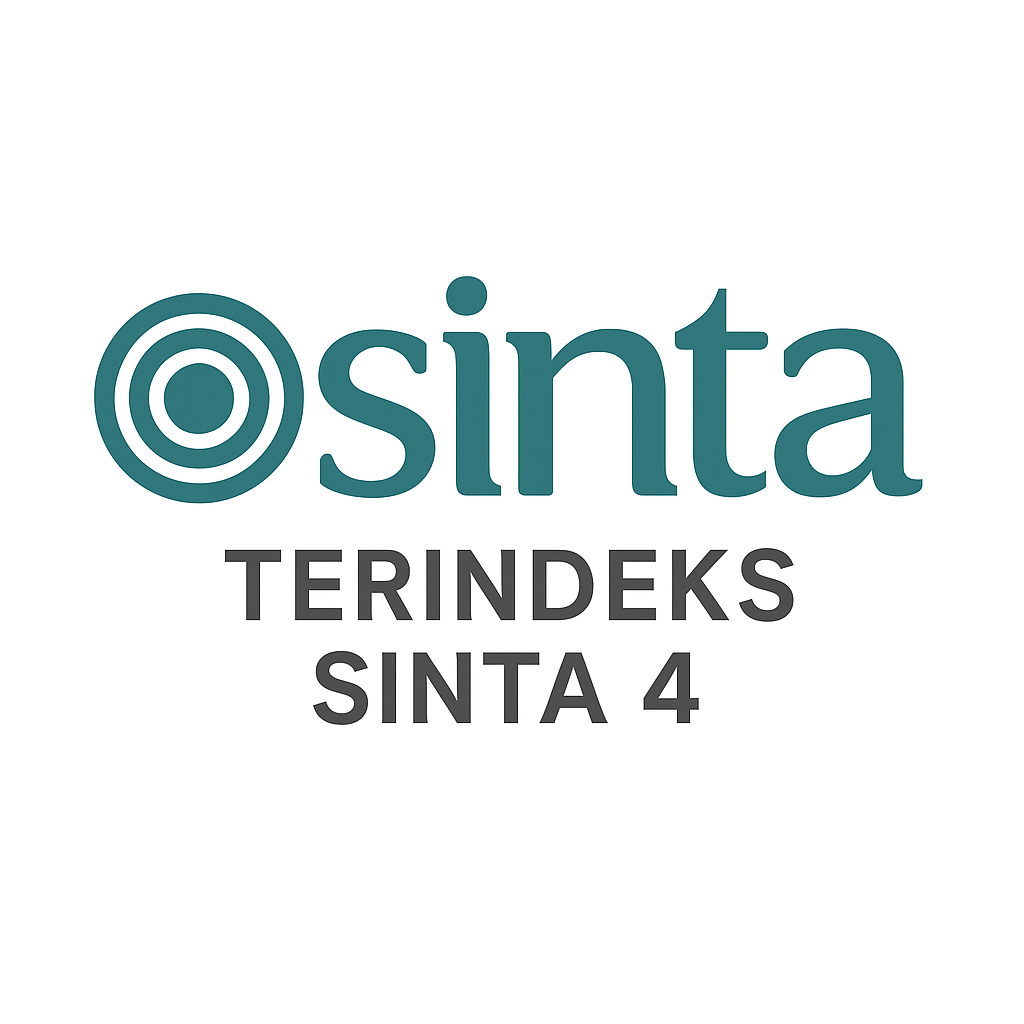Acute Toxicity Assay from Seeds and Flesh of Tarap Fruit (Artocarpus odoratissimus Blanco) Ethanolic Extract against Daphnia magna Larvae
DOI:
https://doi.org/10.30872/j.trop.pharm.chem.v5i2.180Keywords:
Artocarpus odoratissimus Blanco, acute toxocity, Daphnia magnaAbstract
Tarap (Artocarpus odoratissimus Blanco) is one of the plants in the tropics that are consumed by dayak tribe in East Kalimantan. Toxicity tests on seeds and bark have been done but there is no data regarding the acute toxicity of Artocarpus odoratissimus Blanco seeds and flesh of fruit causing the need for acute toxicity tests. This Research to know the acute toxic effects of tarap (Artocarpus odoratissimus Blanco) seed and flesh extracts on larvae of Daphnia magna. Tarap seeds and flesh (Artocarpus odoratissimus Blanco) was taken from dayak market in Samarinda, is East Kalimantan, Indonesia. The seeds and flesh of the tarap fruit are extracted by maceration with ethanol solvent. An acute toxicity test was performed by exposing Dapnia magna larvae aged ? 24 hours with a solution of the experimental group and the control group for 48 hours. Toxicity test results are expressed in percentage of immobilization of larvae of Daphnia magna calculated by probit test to obtain EC50 (Half maximal effective concentration) values. Extracts are toxic if the EC50 value > 1000ppm. EC50 Ethanol extract of tarap seeds obtained values ( 3922,301 ± 324,590 ) for EC50 24h and ( 2964,498 ± 412,498 ) for EC50 48h. The EC50 value of ethanol extract from flesh of tarap fruit is ( 12224.514 ± 2186. 899 ) EC50 24h and ( 6165,235 ± 1940,006 ) EC50 48h.Ethanol extract of tarap fruit and flesh is non toxic to larvae of Daphnia magna.
Downloads
References
Bakar,M.F.A., Karim, F.AM. & Perisamy, E. (2015). Comparison of Phytochemical and Antioxidant Properties of Different Fruit Parts of Selected Artocarpus Species From Sabah, Malaysia. Sains Malaysiana, (pp.355-365).
Bakar,M.F.A.,Mohamed,M., Rahmat,A., & Fry, J. (2009). Phytochemicals and antioxidant activity of different part of bambangan ( Mangifera pajang) and tarap (Artocarpus odoratissimus). Food Chemistry 113, (pp.479-483).
BPOM. (2014). Pedoman uji toksisitas non klinik secara in vivo. Jakarta:Author
Elizabeth, A., & Widjaja, Y. R. (2014). Kekinian Keanekaragaman Hayati Indonesia. Jakarta: LIPI Press.
Fadhli, N.W., Maulidya, V., & Rijai, L. (2017). Identifikasi Metabolit Sekunder, Uji Toksisitas, dan Uji Antioksidan Ekkstrak Kulit Batang Terap (Artocarpus odoratissimus blanco). Proceeding of the 5th Mulawarman Pharmaceuticals Conference, (pp. 100-111). Samarinda.
Galang, F.G. (1955). Fruit and nut growing in the Philippines Malabon, Rizal: AIA Printing Press,
Mutmainnah,P.A., Hakim, A., & Savalas,R.T.(2017). Identifikasi Senyawa Turunan Hasil Fraksinasi Kayu Akar Artocarpus odoratissimus. Jurnal Penelitian Pendidikan IPA (JPPIPA).
Nugroho,H., Pasaribu,M., & Ismail,S. (2018). Toksisitas Akut Ekstrak Albertisia papuana Becc. Pada Daphnia magna dan Danio rerio. Biota Volume 3.
Tasmin,N., Erwin., & Kusuma,Irawan.W. (2014). Isolasi, Identifikasi dan Uji Toksisitas Senyawa Flavonoid Fraksi Kloroform dari Daun Terap (Artocarpus odoratissimus blanco). Jurnal Kimia Mulawarman Volume 12.
United States Enviromental Protection Agency (US EPA).(1996). Ecological Effets Test Guidelines Aquatic Invertebrate Acute Toxicity Test, Freshwater Daphnids.
Watson, L., & Dallwitz, M.J. (1992) The families of flowering plants: descriptions, illustrations, identification and information retrieval. Version 14th December 2000. Retrieved Februari 26, 2019 from http//biodiversity.uno.edu/delta/




